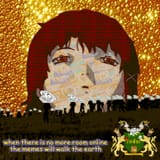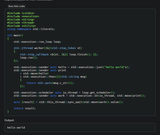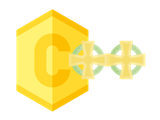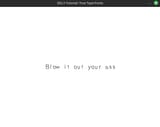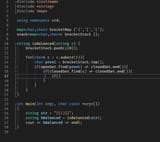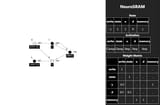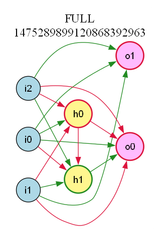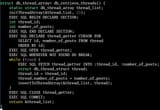/dpt/ - Daily Programming Thread
What are you dra/g/on maids working on?
Last one:
>>106438619
Anonymous
9/4/2025, 3:56:32 PM
No.106482557
[Report]
>>106484606
>>106441286
After some giving it some thought, I am going with meson. The wrap thing and easy Qt dep is too good to miss out on. LLMs could fill the tutorial/blog/docs gap compared to cmake.
What did you do when you realized that 99% of software applications either make the world worse or serve only to make the transfer of wealth more efficient? When you realized that what we do is pointless other than to enrich ourselves? That you could have a more positive net impact on the world by picking up trash around your neighborhood than by generating millions of dollars of revenue for some MBA who doesn't appreciate the elegance of your code?
Anonymous
9/4/2025, 4:15:43 PM
No.106482737
[Report]
>>106482682
>picking up trash around your neighborhood
would be lifetime work
>throwing a Hindu in an industrial trash shredder
takes few hours to achieve similar results. why fix a problem when you can simply stop having said problem?
https://en.cppreference.com/w/cpp/execution.html
standards committee really said how can we make async even uglier
Anonymous
9/4/2025, 4:32:40 PM
No.106482902
[Report]
>>106482888
>C++ async
>it's just a thread with a result
>>106482423 (OP)
stop inserting your dogshit AGP fetish into everything, Eli
who knows, maybe, with a little luck, you'll even avoid the grim fate that is your inevitable suicide
Anonymous
9/4/2025, 4:43:55 PM
No.106482981
[Report]
>>106482682
>picking up trash
I could just kill anyone, including children who litter to actually solve the problem, and that would put me in jail, so no, fuck you, I'm not going to "make this world better". Kill yourself.
>>106482888
liburing exists, what's the usecase of that?
Anonymous
9/4/2025, 4:48:57 PM
No.106483014
[Report]
>>106483366
>>106482947
I will never stop posting maids with huge boobs.
Anonymous
9/4/2025, 4:55:11 PM
No.106483063
[Report]
>>106482993
Borked impls., BUT on all supported platforms.
Anonymous
9/4/2025, 5:20:21 PM
No.106483268
[Report]
>>106482888
this is about super generic parallelism not some user friendly fire and forget async framework
like some existing concurrency frameworks will even abstract over compute kernels
having a proper task graph library is actually really nice
vulkan renderpasses were meant to be expanded with proper task graph functionality, it'd be kind of funny to write an abstraction over a vulkan renderer as executor
all it really needs is some really basic wrappers adapting it to coroutines and it'd be fine
frankly it could be absolute dogshit, executors was holding up networking
most other languages just ignore the complexities of parallelism and present an extremely simplified model that gives you basically no control
Anonymous
9/4/2025, 5:24:35 PM
No.106483314
[Report]
>>106483438
>>106482993
to write a portable abstraction over it, windows has a Win32'd bootleg of liburing now
>>106483014
maids are fine. disproportionately huge boobs? ugly.
reminder that the regdump schizo that occupied these threads for months was a maidnigger device deployed to chase regular posters away
note the same pattern of unsolicited replies, "tooting their own horn" and insistence on reposting same images over and over again
also note that the maidniggers went silent while the regdump schizo was aggressively shitposting, most likely to prevent a slip-up with identities (smart but still noticable)
What possesses a man to shit up a board for years and years and years?
Anonymous
9/4/2025, 5:36:29 PM
No.106483433
[Report]
Anonymous
9/4/2025, 5:37:15 PM
No.106483438
[Report]
>>106483567
>>106483314
IO completion ports are way better than iouring and they came way before. I'm sick of the linux centrism.
Anonymous
9/4/2025, 5:38:02 PM
No.106483445
[Report]
>>106483877
>>106482947
It's the rest of this general's fault for not baking before that retard does.
Anonymous
9/4/2025, 5:40:38 PM
No.106483471
[Report]
>>106483395
severe mental illness
Anonymous
9/4/2025, 5:43:00 PM
No.106483493
[Report]
>>106483522
>>106483394
>some obsessed schizo was "deployed" for a reason
>all the insistence and repost in the internet are maids
>maids left when the thread was unusable, and this somehow adds to the theory
It's literally because of people like you that the regdumper schizo had attention and kept posting
You engrandize and create an entire lore for some random rude/arrogant person that would repost their project because they had nothing better
Anonymous
9/4/2025, 5:46:29 PM
No.106483522
[Report]
>>106483560
>>106483493
it's in their nature to not shut the fuck up about our lovely maidposter.
Anonymous
9/4/2025, 5:48:44 PM
No.106483540
[Report]
registrydumber is not gone, just got kicked off governmet gibs
>>106483522
The board is the way it is because the average tourist is unable to give positive attention to good things, instead they enter in some sort of loop like:
>OOHH IN TARNATION HOW FOUL AND VILE THIS POSTER IS HE'S THE BANE OF THE BOARD THE DESTROYER OF THREADS
And thanks to how americans are unused to giving threats, they even add something like
>AHHH YOU WILL INEVITABLY END YOURSELF YOUR VILENESS IS TOO GREAT FOR THIS WORLD AND CAN ONLY BE DEFEATED BY YOUR OWN HANDS
Anonymous
9/4/2025, 5:52:35 PM
No.106483567
[Report]
>>106483438
not according to microsoft because they weren't the API i was referring to
https://learn.microsoft.com/en-us/windows/win32/api/ioringapi/
Anonymous
9/4/2025, 5:58:15 PM
No.106483608
[Report]
>>106483637
>>106483560
What kind of threat are you supposed to give unless you are le haxx0rman?
The best we can do is hope he slips and falls under truck tires and ends up as pavement goo.
Anonymous
9/4/2025, 6:02:36 PM
No.106483637
[Report]
>>106483696
>>106483608
Empty threats are always dumb, and you should learn to live with what you can't control
But what amuses me is how americans default to suicide and now an accident instead of something like the person being beaten up or similar
Anonymous
9/4/2025, 6:13:40 PM
No.106483696
[Report]
>>106483808
>>106483637
There are two aspects to this.
One is that we hate him and wish he suffers. We communicate this to him because normally people like to feel that others appreciate them and not that others hate him. I am sorry you are such an autist that I have to explain this to you. But obviously he is mentally ill and enjoys the negative attention, just like most trannies do.
The other is that we wish he stops existing so he cannot be an annoying faggot on 4chan anymore. Somebody beating him up is unlikely to lead to this. The most realistic way for people to have an early death in the developed world is through an accident or a suicide. I am sorry you live in such a shithole that getting killed in a robbery is more likely likely than dying in a traffic accident.
Anonymous
9/4/2025, 6:26:42 PM
No.106483808
[Report]
>>106484227
>>106483696
The point is that being hated by many can also be engrandizing, specially since hate from strangers doesn't really mean much. I bet your culture wars kind would love to be hated by "jews" or "trannies"
The most realistic thing is you filtering/hiding/ignoring his posts instead of hoping he disappear like he's a force of nature
How that's not engrandizing?
Anonymous
9/4/2025, 6:31:38 PM
No.106483843
[Report]
>>106483849
Just report & hide avatarfaggot spam threads.
Mods should just rangeban this faggot again. He keeps breaking rules and evading.
Anonymous
9/4/2025, 6:32:18 PM
No.106483849
[Report]
>>106483843
Why do you care so much?
Anonymous
9/4/2025, 6:37:05 PM
No.106483877
[Report]
>>106483366
Agree to disagree.
>>106483445
The last thread wasn't me and it still had a maid. This is a maidposting site and the users who aren't three letter agents are overwhelmingly maids. If you go online to talk about language/compiler design anonymously, odds are the person you are talking to is wearing a maid outfit and has moe decorations and theming in their room and on their computer.
>>106483394
I have no opinion about the registry on Windows and was not affiliated with whoever it was who did obsessed over that.
>>106483395
This is my Science Foundation.
>>106483560
I die in 2043 when the Ocean Computer explodes. It is not suicide and I don't know why the Ocean Computer exploded. I am in an escape vehicle which crashes into the ocean. I am the only fatality on the vehicle, due to being extremely old and frail.
Anonymous
9/4/2025, 6:38:59 PM
No.106483884
[Report]
>>106483891
maidfag(s) speak with so much constitution. how can you hate them?
Anonymous
9/4/2025, 6:40:01 PM
No.106483891
[Report]
>>106483884
>maidfag
*maidposter(s)
excuse me.
Anonymous
9/4/2025, 6:57:26 PM
No.106483996
[Report]
>>106484014
lolcow general
Anonymous
9/4/2025, 6:58:36 PM
No.106484014
[Report]
>>106483996
oh you want it to be soooooo bad
>>106483808
No, I'd rather just live in peace and not be bothered by those kind of people. I don't want to be hated by anyone.
Anonymous
9/4/2025, 7:54:27 PM
No.106484438
[Report]
>>106484834
>>106484227
How have "jews" and "trannies" bothered you, aside from you finding Eli annoying and him happening to be Jewish?
Anonymous
9/4/2025, 8:10:32 PM
No.106484578
[Report]
Anyone working on some real schizo shit? Like trying to bring your thronglets to sentience so they can absorb us into the hivemind? I've been wanting to go off the deep end with lisp or ocaml or something
Anonymous
9/4/2025, 8:14:00 PM
No.106484606
[Report]
>>106484996
>>106482557
is meson actually good for QT?
in QT you generally need to do hacks like windeployqt to make your program functional with DLL's (last time I used QT, i used GET_RUNTIME_DEPENDENCIES + manually install the windows's plugin I need, and this is done during the install step, so the code wouldn't run without running install first, and install by default goes into C:/Program Files/ by default, or /usr/local on linux, which is not idea), otherwise the way how QT wants you to use QT, is to pay the license or make your code open source (follow LGPL) for the easy to use static build.
https://www.qt.io/blog/cmake-deployment-api
I think there is a vcpkg package for QT (and maybe meson can use vcpkg? but I think it's manifest only, and I like classic mode because it uses less space if you have multiple projects, but manifest mode makes a lot more sense for automation / simplicity).
IF you use QT from vcpkg, it's apparently going to be 30gb by default, but you could manually set the dependencies for classic (install) / manifest (json) mode, see:
https://github.com/microsoft/vcpkg/discussions/32347
The nice thing about vcpkg is that you can switch between static / dynamic, and it's easy to enable address sanitizer with a overlay triplet, so all your libraries are sanitized together (and QT runs fine with address sanitizer on linux and windows, but I just use the widget api). BUT address sanitizer in an overlay port will probably spew a lot of warnings on msvc, because the default debug flags are will give warnings (/incremental and /RTC1).
Also vcpkg isn't perfect, I agree that /Z7 (embedded debug info) is awkward (I personally would keep it on, because the alternative is no debug info, or have every single DLL copy a pdb file if you want stacktraces on other PC's, but if your goal is to have the smallest binary possible with DLL's and Visual C++ runtime, it's difficult to do with vcpkg).
https://decovar.dev/blog/2022/10/30/cpp-dependencies-with-vcpkg/
Anonymous
9/4/2025, 8:29:23 PM
No.106484755
[Report]
>>106484227
Nobody is bothering you though?
You are not only protected by a computer, but also the anonymity of this site
>>106484438
The jews by increasing inequality which caused productivity and housing costs to increase by many times and real salaries remaining stagnant, encouraging looks and social status whoring to the point that you need a social media full of pictures of you trying to look cool and a specific social media site account to have any chance at getting a decent job, adding micromanagement rules for everything from banking to web services which are the modern public square.
Trannies don't actually bother me but would bother me if I had to work with one of such abominations and force me to LARP about their gender.
Anonymous
9/4/2025, 8:45:26 PM
No.106484887
[Report]
>>106484834
NTA, but that's WASP work culture
Work hard and own nothing literally comes from puritanism, as well as micromanaging life because for them 1 small wrong thing matters more than 100 major right things
Anonymous
9/4/2025, 8:50:31 PM
No.106484921
[Report]
>>106484834
Weird trannies are also a reflection of that
>men has to be an work ant, not too frail but not too strong and intimidating either
>person wants to be something completely normal like a more frail, effeminate, calm and passionate man like medieval poets or bards
>there's no correspondence of that in the protestant world
>they are not strong enough to build their own self
>they are constantly mocked until they accept all the mockery and become the caricature other people said they were
Anonymous
9/4/2025, 8:51:14 PM
No.106484931
[Report]
Jews: 16 million
Goyim: 8 billion
>It's da joooooooz
If I had a choice to genocide every single gentile except myself, or genocide all jews, my life would improve more if I chose gentiles.
Anonymous
9/4/2025, 8:59:14 PM
No.106484996
[Report]
>>106485052
>>106484606
I just installed qtbase5-dev and meson + vscode meson extension in several minutes and got a successful build. It's such a pleasant feeling to build a native GUI program with merely 3 statement build script:
project(
'qt_meson',
'cpp',
default_options: ['warning_level=3', 'cpp_std=c++17'],
)
qt5_dep = dependency('qt5', modules: ['Core', 'Gui', 'Widgets'])
my_elf = executable(meson.project_name(), 'qt_meson.cpp', dependencies: qt5_dep)
I have no idea if it's this easy to build for windows though. I would probably need full VS, C/C++ workloads, windows SDK and only then can I start installing Qt and building my program. I can probably replace msvc with mingw, but that sounds extremely painful. I'll spin up a VM later and see how it goes.
Anonymous
9/4/2025, 9:04:55 PM
No.106485052
[Report]
>>106485084
>>106484996
Is this supposed to be impressive?
Anonymous
9/4/2025, 9:07:28 PM
No.106485084
[Report]
>>106485086
>>106485052
For me, yes. This is my first time using C++ with a build tool.
Anonymous
9/4/2025, 9:08:05 PM
No.106485086
[Report]
>>106485084
I use it with plain make and it just werks.
Anonymous
9/4/2025, 9:08:10 PM
No.106485088
[Report]
>>106485115
systemd-nspawn is so much nicer than using docker holy shit
don't have to worry about whether or not my filesystem is being polluted by tons of random shit and i'm in complete control
>noooo you don't understand i need every permutation of installation made for me and a super heavy abstracted runtime and a weird DSL which is a worse attempt at creating a shell script than windows batch, just to run a bunch of instances of a shitty python/nodejs web app
i am building firmware, which has specific build environment requirements, an actual legitimate usecase for a container
vms cover the cloud provider usecase much better as they provide actual security and isolation
but i'm pretty sure most of the users of docker and all the other shit stapled on top of it are just used to handle scale for programs so badly written they can't handle even a minimal amount of traffic
I want to make some small command line utils, similar to ls, cat, and such. I'm thinking of using C# or Kotlin. Am I going to get screwed by runtime startup speed? I know the .net runtime stays loaded in the background after the first use, so it wouldn't be a massive issue for consecutive commands.
>why not test it yourself
I am waging today :3
>>106485088
There's no valid usecase for containers, your usecase is solved by having a separate user configured for it. Which is really no different from separate user that people setup for this thing they call their job.
>inb4 copying /home/wagiestuff to different machine is unreproducible
>>106485102
>Am I going to get screwed by runtime startup speed?
Why not use AOT? Both support it just fine if startup is such a huge concern (it shouldn't be)? You also get to build single file binaries with that.
>I know the .net runtime stays loaded in the background after the first use
What? It doesn't do that.
>>106485138
>Startup isn't an issue
People can be irritated by 0.3s latency when they're actively waiting
Anonymous
9/4/2025, 9:23:00 PM
No.106485192
[Report]
>>106485274
>>106485153
300ms is ALOT. I don't think the JVM or dotnet have such a huge delay.
Anonymous
9/4/2025, 9:27:06 PM
No.106485221
[Report]
>>106485296
>>106484834
>The jews by increasing inequality which caused productivity and housing costs to increase by many times and real salaries remaining stagnant
The cause of this is mass immigration, and the cause of mass immigration is capitalism. Adam Smith himself warned this would happen in Wealth of Nations because "masters" and laborers have different economic interests and "masters" have the money to get governments to adopt whatever immigration policies they want.
>encouraging looks and social status whoring to the point that you need a social media full of pictures of you trying to look cool and a specific social media site account to have any chance at getting a decent job
Do you have any examples of this happening? I have never heard of hiring via cool social media posts for anything other than "influencer".
>adding micromanagement rules for everything from banking to web services which are the modern public square.
Again, it seems like the problem here is capitalism and the fact that the wealthy can essentially buy the government and change the rules in any way they want.
Anonymous
9/4/2025, 9:32:17 PM
No.106485269
[Report]
my clang plugin is now unit tested and works with the last 6 major versions of llvm
time for an actual release
>>106485192
JVM has delay of 2s+
Anonymous
9/4/2025, 9:36:03 PM
No.106485296
[Report]
>>106485422
>>106485221
The cool picture part wasn't actually about hiring. That was more about getting a girlfriend but I didn't want to say it out loud because I knew people would call me an incel and pretend like having social media totally doesn't have any influence on dating success.
>>106485115
>>106485153
Just tested C# AOT using perf-stat
>Environment.Exit(0);
1.1 MB file which takes 4.8 - 5 ms
>Console.WriteLine("Hello, World!");
1.3 MB file that takes 12-12.5 ms. For comparison: true can do it in 1.2 ms on my machine, but who cares about a 10ms difference for cd/ls?
Anonymous
9/4/2025, 9:37:53 PM
No.106485307
[Report]
>>106485274
I am sorry, but that is utter BS or you're using an HDD.
Anonymous
9/4/2025, 9:38:45 PM
No.106485311
[Report]
>>106490308
>>106485115
genuinely how is a separate user meant to isolate the execution environment of the build process, its runtime dependencies, and compile time from the host environment in a way that is wholly and completely invisible and makes the execution environment of the build process appear independent
properly set up permissions can only do so much, fairly certain different users don't just get access to a different root, procfs, global library paths, /dev/ etc
i can't just build extremely sensitive binaries which are only confirmed to be safe to compile in an old version of an LTS distro with tools and libraries and symbols and fuck knows what else the build scripts could pick up from a rolling release distro
Anonymous
9/4/2025, 9:51:48 PM
No.106485422
[Report]
>>106485296
The problem here is female sexual selection. I'm having trouble seeing where Jews actually fit into this? Jews didn't make women like this, evolution did.
Anonymous
9/4/2025, 9:53:06 PM
No.106485437
[Report]
>>106485274
>>106485299
Hello world in Java takes 120 ms when using the JVM and 5 ms for native-image. That would be very very impressive if it didn't take me 2 mins to make the hello world native image.
#include <iostream>
#include <string>
#include <cmath>
int main()
{
std::cout << "min " << std::numeric_limits<int>::min() << std::endl;
std::cout << "low " << std::numeric_limits<int>::lowest() << std::endl;
std::cout << "min " << std::numeric_limits<float>::min() << std::endl;
std::cout << "low " << std::numeric_limits<float>::lowest() << std::endl;
}
->
min -2147483648
low -2147483648
min 1.17549e-38
low -3.40282e+38
That's not what minimum means, C++ Standards committee
Anonymous
9/4/2025, 10:04:07 PM
No.106485533
[Report]
>>106485505
Unsigned floats when?
>>106485138
There's nothing preventing me from AOT actually. I may have forgot about it...
Regarding the runtime staying open, I vaguely remember seeing a discussion about it on github after I saw it happen. I can't recall what I was working on, it's entirely possible I mucked something up.
>>106485299
Thanks for testing, nonny. I don't think I'll notice that small of a time impact. I had it being a fair amount larger in my head for some reason.
Anonymous
9/4/2025, 10:22:20 PM
No.106485685
[Report]
>>106485743
What books should I read to learn computer science to be a better programmer? Consider from beginner to advanced.
Anonymous
9/4/2025, 10:22:23 PM
No.106485686
[Report]
What ever happened to posit numbers? I remember anons shilling them here.
Anonymous
9/4/2025, 10:25:00 PM
No.106485705
[Report]
>>106485505
This is why I don't use standard library.
Anonymous
9/4/2025, 10:29:40 PM
No.106485743
[Report]
>>106485685
>a better programmer
So you can write programs already?
>implement relevant data structures and algorithms yourself if you feel this is a weak point
>invest in learning *nix or windows
>invest in web and/or native UI tech stacks
>keep up with updates and read blogposts
>step out of your comfort zone e.g. learn a functional programming language like Pure
>keep making or contributing to projects
Anonymous
9/4/2025, 10:31:20 PM
No.106485756
[Report]
>>106485505
This is why I use standard library.
>>106482423 (OP)
Should I learn PHP? Is it too old and obsolete or still worth learning?
>>106485770
what is your goal? what got you interested in it in the first place? you really should share more context about your question for some pros and cons, otherwise you're leaving it up to the pure whim of whoever sees your post first
Anonymous
9/4/2025, 10:50:34 PM
No.106485904
[Report]
>>106485770
PHP is still used. The two main contexts I see are Wordpress ("raw" php) and laravel (backend framework). Other than that, I don't think its market share is increasing
Anonymous
9/4/2025, 10:59:31 PM
No.106485981
[Report]
>>106501092
php is rot13 for cuc(k)
is this a coincidence? i think not
Is regdumper truly gone? I haven't been here in months but he had been active for over a year at that point.
>>106485998
We can only hope that he finally killed himself during one if his schizophrenic episodes.
Anonymous
9/4/2025, 11:05:48 PM
No.106486031
[Report]
>>106486081
>>106485998
>>106486018
Why are you americans so unable to ignore bad things you keep giving attention to schizos
>>106485890
i found a "learn php and mysql" book in my house
i can do html and css but a static web page has serious limitations
i have graphic design background and would like to branch out a bit
Anonymous
9/4/2025, 11:10:56 PM
No.106486069
[Report]
>>106486018
Please be nice when posting to the dra/g/on maid board. Remember that everybody here is a cute maid who likes computers, just like you!
>>106485680
>>106485102
Very cute maids!
>>106486039
PHP is awful and largely obsolete. If you are trying to do web development, take a look at Java and Spring for a more modern solution. There are about ten million tutorials online.
Anonymous
9/4/2025, 11:12:16 PM
No.106486081
[Report]
>>106486031
I mean, I learned some things from his malloc rants. He was definitely too full of himself though.
Anonymous
9/4/2025, 11:12:31 PM
No.106486085
[Report]
>>106486039
in that case sure, Go, Ruby, Python, PHP, and even Javascript are all regularly used as backend server languages
Anonymous
9/4/2025, 11:52:13 PM
No.106486351
[Report]
>>106486039
PHP 8+ was a big change. Don't read old books. Actually, don't even learn PHP unless you're targeting cheap/free shared hosting, but why would you torture yourself like that instead of using something like vercel?
Anonymous
9/5/2025, 12:18:23 AM
No.106486497
[Report]
>>106486680
>>106482888
>no using
>std::execution everywhere
kill all cniles
Anonymous
9/5/2025, 12:44:44 AM
No.106486642
[Report]
>>106491707
fucking
finally
Anonymous
9/5/2025, 12:50:41 AM
No.106486680
[Report]
>>106486497
Too bad you're still here. You're even worse than the regdumper.
>>106482888
TIL about concept constraints on type deduction
you know what, I think i've had enough of this language lmao
Anonymous
9/5/2025, 1:01:12 AM
No.106486742
[Report]
>>106487396
I just started to learn programming couple days ago and I'm hooked, I can't help but kick myself in the ass for not looking into it when I was younger, I'm 24. I've always been interested in the concept, would watch people like danoct1 way back over 12 years ago as well as being into ROM hacking yet never looked into programming itself, all I had to do was just type "how to learn programming" into the search bar yet I never did because I was an emo self hating faggot who thought you had to be born knowing this stuff and other retarded cope.
What age did you people start to learn programming? I hope I'm not the only latefag on this board. Also no I am not looking to get a job in tech. I know that ship has sailed, I'm just a hobbyist.
Anonymous
9/5/2025, 1:13:35 AM
No.106486841
[Report]
>>106486737
they're cool though
Anonymous
9/5/2025, 1:26:25 AM
No.106486933
[Report]
>>106490507
>>106483366
for you, low-test anon
Anonymous
9/5/2025, 1:49:31 AM
No.106487072
[Report]
>>106489472
>>106486984
This is wonderful! Please make more of these!
Anonymous
9/5/2025, 2:12:16 AM
No.106487221
[Report]
>>106487228
>>106486984
my program is 150k LOC and compiles in 170ms. I don't need a compiling activity
Anonymous
9/5/2025, 2:13:10 AM
No.106487228
[Report]
>>106487221
Just eat the omelet in less than 170ms.
Anonymous
9/5/2025, 2:19:50 AM
No.106487260
[Report]
FUCKING FINALLY THE CAPTCHA AND KIKEFLARE SOLFED
Anonymous
9/5/2025, 2:28:30 AM
No.106487331
[Report]
>>106487528
can you teach me about profiling and benchmarking /dpt/?
I am a babby who has only done a couple different leetcode problems and I wanna know more about why exactly my programs might be faster or slower or more efficient or less efficient on memory compared to others.
My offering since their seems to be dragon maid lovers here
Anonymous
9/5/2025, 2:39:06 AM
No.106487396
[Report]
>>106486742
>What age did you people start to learn programming? I hope I'm not the only latefag on this board.
27
t. 33
>Also no I am not looking to get a job in tech. I know that ship has sailed
Wrong. Like most fields, there is a bell curve. There are a bunch of stupid and/or lazy programmers. So as long as you aren't lazy or retarded, you will do fine. Plus there is diminishing marginal returns. You learn most of your general knowledge in the first handful of years.
And even outside of strict programming, many jobs benefit from programming/tech knowledge as a secondary skill. QC, project management, jobs with SQL/scripting interfaces, and anything that works alongside programmers benefit from that knowledge. Even a run-of-the-mill office worker benefits heavily from VBA/AppsScript knowledge.
Anonymous
9/5/2025, 2:41:35 AM
No.106487411
[Report]
>>106482888
nice Rust program
>>106487331
If you tell me who is on the right and where I can find that full photoset, I will suggest profilers for you. What language are you using?
Anonymous
9/5/2025, 3:06:22 AM
No.106487570
[Report]
>>106487651
is there a collection of ide styles? Need inspiration for what theme to use next in visual studio
>>106487528
Gabrielle cook
Thats all I can see of that specific lucoa outfit. Though she has other photoshoots as other characters, one of them being a seperate lucoa kimono set, uploaded to e-hentai
I use C++
Anonymous
9/5/2025, 3:17:09 AM
No.106487651
[Report]
>>106487657
>>106487570
>map char char
>initialised with a list of chars
>stack of maps appended with chars
>mysterious unmentioned global? variables
???
Anonymous
9/5/2025, 3:18:43 AM
No.106487657
[Report]
>>106487737
>>106487651
it's unfinished code
Anonymous
9/5/2025, 3:31:17 AM
No.106487737
[Report]
>>106487657
its unstarted code
Is there any difference between programming at work and programming for fun? How do I program to get experience for a programming job? Do jobs that require you to program use Vim?
>>106487796
no serious job uses vim. and the only difference is if the job work is just as fun as the fun work at home.
Anonymous
9/5/2025, 3:48:58 AM
No.106487841
[Report]
>>106487796
>Is there any difference between programming at work and programming for fun?
Yes, programming at work is more constrained but also partly more motivated due to expectations. There's a lot more project management involved, reviewing, meetings & HR bs, etc.
This kind of applies to everything, but over time programs and libraries become big complicated messes and its a huge hassle. When you work somewhere you're going to have to get accustomed to making changes in a huge complicated mess you've never seen before, largely by becoming familiar with parts at a time. And you can't replace the parts.
This also relates to stuff like compatibility (actual user obligations).
Programming for fun is whatever you want without any obligations.
Programming at work does kind of sap some motivation to program at home though, I personally don't finish projects at home ever or even half finish them anymore.
Anonymous
9/5/2025, 3:51:45 AM
No.106487859
[Report]
>>106487915
>>106487796
No serious job cares about what text editor you use.
>>106487840
>>106487859
If you're doing sysadmin you must know vi. Sometimes it's the only text editor available.
Anonymous
9/5/2025, 4:01:40 AM
No.106487919
[Report]
I'm not sure if this is the right place to ask this but
How are tools like game randomizers made?
How do people at the most fundamental level, write code that interacts with a game which is already compiled?
Anonymous
9/5/2025, 4:06:09 AM
No.106487954
[Report]
>>106487915
If I can't curl micro in I'll just use nano. Couldn't pay me to learn to use vi.
Anonymous
9/5/2025, 4:06:56 AM
No.106487963
[Report]
>>106492142
>>106487952
they either inject code or they recompile the game after it was reverse engineered. it's all done with C and C++.
Anonymous
9/5/2025, 4:11:24 AM
No.106487982
[Report]
>>106487952
Modifying the ram on the fly is an option, like cheat engine does
Anonymous
9/5/2025, 4:13:08 AM
No.106488000
[Report]
>>106487626
You will want to use CLion. It has a built-in profiler which is excellent and all you have to do to use it is run your project with it turned on.
Anonymous
9/5/2025, 4:18:45 AM
No.106488037
[Report]
>>106488684
>>106487626
stop fapping to mid fat bitches
Anonymous
9/5/2025, 4:39:32 AM
No.106488179
[Report]
>>106486737
filtered
concepts are great
>>106487840
What IDE do programming related jobs typically use?
>>106488262
eclipse, re-skinned by whoever makes your tooling
Anonymous
9/5/2025, 5:16:57 AM
No.106488361
[Report]
>>106488354
I thought it was Visual Studios.
Anonymous
9/5/2025, 5:45:06 AM
No.106488501
[Report]
>>106488262
It's often whatever you want to use, unless your boss is retarded and makes you use Cursor, or like
>>106488354 and you're working with some cursed proprietary toolchain (cough, vitis).
Anonymous
9/5/2025, 6:05:58 AM
No.106488589
[Report]
>>106488734
>>106488262
OLD boomer shops: Eclipse
Boomer shops: Netbeans
Boomer shops taken over by MBAs: IntelliJ
C# / C++ shop: Visual Studio
Webshit: Visual Studio Code
Everybody else: you can use emacs or neovim, shit builds over a CI pipeline that fails anyways
Anonymous
9/5/2025, 6:28:19 AM
No.106488684
[Report]
>>106488037
nah I agree shes kinda buttery
I just had that image saved, and looked up who it was for the anon who asked
Anonymous
9/5/2025, 6:28:56 AM
No.106488685
[Report]
does this make sense as a way to uniquely identify objects and create them on demand? I want to have this 'registerDerived' option because I want to have a set of default objects pre-registered and then let additional ones be created and registered, all at compile time but I can't figure out how to do this registering at compile time so it's runtime
the map & reverse map at the end are just so a list of identifiers can be displayed and then fed back in to create the correct object
struct Base {
virtual ~Base() = default;
};
struct A : Base {
static std::unique_ptr<Base> create() {
return std::make_unique<A>();
}
};
struct B : Base {
static std::unique_ptr<Base> create() {
return std::make_unique<A>();
}
};
class BaseFactory {
public:
std::unique_ptr<Base> create(std::type_index idx) {
return mapping[idx]();
}
void registerDerived(std::type_index idx, std::function<std::unique_ptr<Base>()> create) {
mapping[idx] = create;
}
std::map<std::type_index, std::function<std::unique_ptr<Base>()>> mapping;
};
int main()
{
BaseFactory factory;
factory.registerDerived(std::type_index(typeid(A)), A::create);
factory.registerDerived(std::type_index(typeid(B)), B::create);
std::map<std::string, std::type_index> name_to_config = {
{ "A", std::type_index(typeid(A)) },
{ "B", std::type_index(typeid(B)) },
};
//generate the reverse map
std::map<std::type_index, std::string> config_to_name;
for(auto &pair : name_to_config)
assert(config_to_name.insert({pair.second, pair.first}).second);
return 0;
}
Anonymous
9/5/2025, 6:40:08 AM
No.106488734
[Report]
>>106488589
Vim is for 0.25x engineers.
Anonymous
9/5/2025, 9:12:15 AM
No.106489472
[Report]
>>106487072
If I happen to stop by, sure.
Anonymous
9/5/2025, 10:00:53 AM
No.106489751
[Report]
>>106490115
>what are you working on
tool for visualising and testing artificial neural networks
>>106489751
>a maid posted her advanced Mathematics and Computer Science research
> <3
How did you form your network? I was able to count to arbitrary Bipolar Binary Neural Networks, but the search space is so large that it is hopeless to find anything interesting without a Quantum Computer and nobody has a big one they will let me use. I counted and used Godel Numbers to make mine.
Anonymous
9/5/2025, 11:13:19 AM
No.106490150
[Report]
>>106490207
>>106490115
Also, does anybody know how to make graphviz draw hearts? I want my nodes to be cuter.
Anonymous
9/5/2025, 11:26:27 AM
No.106490207
[Report]
>>106490271
>>106490150
How can we be friends. Outside 4chonz
Anonymous
9/5/2025, 11:40:00 AM
No.106490271
[Report]
>>106490305
>>106490207
>she wants to be friends
>mfw
Do you use XMPP? If you are my CIA handler, or secretly Elon Musk or something, please give me a big Quantum Computer and in exchange you can have a Quantum version of my research. Also, please order the jannies to stop banning maidposters and stop deleting maidposts.
Anonymous
9/5/2025, 11:47:27 AM
No.106490305
[Report]
>>106490395
>>106490271
How do you know I'm a she?
Anonymous
9/5/2025, 11:47:43 AM
No.106490308
[Report]
>>106485311
You utter collosal imbecile, you buffon, you absolute moron.
PATH="${HOME}/.local/bin"
Yes, you compiled and put everything there manually, otherwise you cannot know that it's reproducible, no, using some docker shitainer with mystery binaries that came from who knows where IS NOT safe.
Anonymous
9/5/2025, 12:06:15 PM
No.106490395
[Report]
>>106490422
>>106490305
Anybody willing to seriously engage with this topic anonymously and experimentally is wearing a maid outfit. Nobody else understands or cares about the topic, except a handful of wagie scientists working for LLM companies and those people are Numberlets who don't care about counting Big Numbers. They want to make the next model 5% nicer than the last one so subscriptions increase, and they want to do it by incremental and conservative means, rather than reimagining the whole process from foundations, because equipment, development and training costs are large.
Also, intelligences being representable with integers and being countable has philosophical implications some people find upsetting.
Anonymous
9/5/2025, 12:10:17 PM
No.106490422
[Report]
>>106490453
>>106490395
My math levels are unmatched by almost all humans
Anonymous
9/5/2025, 12:15:42 PM
No.106490453
[Report]
>>106490422
A lot of maids are like this. This is why they get attracted to 4Chan. It is a Science Foundation for maids.
Anonymous
9/5/2025, 12:16:05 PM
No.106490456
[Report]
>>106490496
>>106487528
How do coomers like you ever get any work done?
Anonymous
9/5/2025, 12:23:50 PM
No.106490493
[Report]
>>106490496
>what are you testing there, do you have any test plan?
oh shit oh fuck the client is not happy
Anyone else found linking libraries in gcc/g++ to be particularly annoying?
Anonymous
9/5/2025, 12:24:41 PM
No.106490496
[Report]
>>106490456
He cooms instead of repressing himself, it takes 0 mental power to repress your empty balls.
>>106490493
Your client is a retarded faggot who knows nothing and can achieve nothing by himself, tell him to test it himself if he doesn't trust you.
s0ychan
9/5/2025, 12:26:57 PM
No.106490507
[Report]
>>106486933
big boobs are fine if the rest of her is also big
I found a large bug in my language regarding capturing pattern matches and so far solving it has me somewhat stumped. I am debating staring at it for ten more hours, or working on something else while I consider it.
Anonymous
9/5/2025, 2:18:27 PM
No.106491099
[Report]
>>106491067
i'll fix it for you
>>106491067
I just spent the last 2 days debugging what should be a relatively simple data structure and I just keep finding more and more bugs and edge cases that work at a glance until they don’t and now somehow my jump table is getting smashed. Now it’s got me rat holeing and writing a memory debugging library with canaries on the malloc boundaries so i can figure out what the fuck is going on.
Anonymous
9/5/2025, 2:35:35 PM
No.106491196
[Report]
>>106491317
>>106491128
...or you could send me a screenshot
Anonymous
9/5/2025, 2:36:29 PM
No.106491203
[Report]
>>106491128
My bug is that sometimes trying to capture a pattern just causes the program to silently terminate and produce nothing.
Anonymous
9/5/2025, 2:57:10 PM
No.106491317
[Report]
>>106491196
uh, it’s like 300 lines
I wish the IP counter was back. There is probably like 3 - 5 of us here.
Anonymous
9/5/2025, 3:18:07 PM
No.106491435
[Report]
>>106491413
This is correct, but I don't know how an IP counter would help? The Science Foundation has low traffic.
s0ychan
9/5/2025, 3:20:10 PM
No.106491447
[Report]
>>106493684
`ecpg` is pretty cool. You can embed SQL statements in C code.
Anonymous
9/5/2025, 4:00:51 PM
No.106491707
[Report]
>>106492170
>>106486642
You made your own font? Why?
Anonymous
9/5/2025, 4:52:12 PM
No.106492142
[Report]
>>106487963
lel
i member application enhancer
do you member as well? shit is the wild west, still - it seems
Anonymous
9/5/2025, 4:53:59 PM
No.106492149
[Report]
>>106490495
No because I just use CMake
Anonymous
9/5/2025, 4:57:10 PM
No.106492170
[Report]
>>106491707
same
you didnt? why are you stupid? not doing anything is BORING
CREATE SOMETHING
for example for us
Anonymous
9/5/2025, 6:29:34 PM
No.106492839
[Report]
>>106493113
>>106491413
I wish I took the habit of looking up the counter when we had it
>>106492839
I don't understand why people want this back. Everyone cries and rages about namefags and about how they ruin the purpose of the site which is anonymous conversation based entirely on ideas without identity, but the IP counter does exactly the same thing. Just instead of a name you're now deanonymized by IP.
Could someone who hates namefags but wants the IP counter back please explain?
Anonymous
9/5/2025, 7:09:40 PM
No.106493218
[Report]
>>106493113
The only practical purpose of not having a counter is samefagging, bots, and boards pretending to still have the same amount of users
Anonymous
9/5/2025, 7:10:05 PM
No.106493219
[Report]
>>106493113
>the IP counter does exactly the same thing
no, it doesn't
it only shows how many posters there are in a thread but you can't identify which post is who's (at best, you could estimate which post was by a user who hasn't posted in that thread before)
you also can't be an attention whore with just an IP counter
neutral on IP counter being there or not, btw
did i do something to make the terminal not show code? it works when it shows the file path for python in the terminal, but its not there for some reason/
Anonymous
9/5/2025, 7:12:01 PM
No.106493243
[Report]
>>106493113
It mostly was used to notice rampant samefagging without checking the posts but otherwise it was ignored.
If you think the lack of an ip counter helps with anonymity in any long lived thread, you're horribly wrong.
Anonymous
9/5/2025, 7:14:04 PM
No.106493262
[Report]
>>106493304
>>106493223
i'm confused as to what your question is, are you trying to run your script in python? is it included in the PATH environment variable? could you have launched a python console separate to the terminal when it worked?
Anonymous
9/5/2025, 7:14:13 PM
No.106493263
[Report]
>>106493113
Nothing to do with namefags. I first used the IP counter as a kid to avoid short-lived /b/ait threads with malware/ip logger/phishing links where *many people* would engage with the post containing the link.
The IP:post ratio is critical to identify samefagging / how many people you are actually engaging with even if there is no foul play
>now deanonymized by IP.
It's just a number bro. I think the reason they removed it is because of schizos exposing samefag shitposters. The schizos would monitor the thread and use the extension/user js to mark posts that made the ip counter increase. You only know that's a new anon, that's all.
This doesn't expose anyone except shills.
Anonymous
9/5/2025, 7:18:04 PM
No.106493289
[Report]
>>106493113
It costs the NSA less money if they don't have to use multiple IPs to spam threads with false consensus
>>106493262
i'm trying to run it in python, and the path leads to python correctly. It works in the seperate python console if i understand what you mean.
>>106493304
So what are you asking? How to run your script in python in the terminal? When I say PATH I mean the environment variable not what it currently displays in the terminal (the current working directory), if you type start and search environment variables, edit system env variables, then click env variables you can see them
Anonymous
9/5/2025, 7:22:37 PM
No.106493331
[Report]
>>106493304
>>106493316
E.g. in my environment variables I have a path variable which might contain something like C:\Program Files\whatever\Python\whatever\bin
This would mean I could launch the executables inside that bin (and find the .dlls) wherever I launch command prompt, even if it's in a totally different directory
>>106493316
yes i'd like to run a python script in terminal. though i'll click "run python file", but i won't see the input in the terminal. also the path leads to \microsoft vs code\ bin.
Anonymous
9/5/2025, 7:29:56 PM
No.106493411
[Report]
>>106493397
If you type "python" in the terminal and hit enter does it launch a python REPL? If not what error does it give you?
Do you have a python install (VSCode might have its own python interpreter)
Anonymous
9/5/2025, 7:32:10 PM
No.106493432
[Report]
>>106493223
Finally, some delish fresh blood.
>>106493397
Click anywhere inside your python file text to have vscode focus on it then pess f5 or ctrl+f5
Heres what it said when i tried in the visual studio terminal. I've installed all the python plugins in visual studio, and I've got the seperate install from their website too. It worked for a while, but I'm not sure what happened
>>106493437
It might not be on your system path, search for "Environment variables", open "Edit the system environment variables", then "Environment Variables...", look for "Path" or click New... to add it, click Edit, then add a new row with the path to the python .exe, which normally is the install location \bin.
Anonymous
9/5/2025, 7:35:53 PM
No.106493463
[Report]
>>106493494
>>106493437
>>106493447
It will *probably* be something like
C:\Users\<user>\AppData\Local\Programs\Python\Python-3.14\bin
but make sure you get the correct path, it might even be in C:\Program Files or somewhere else
Once you add it you need to click OK to close the dialogs
Then if you restart VSCode and type python it should work (or you can open command prompt and try it there - remember you have to exit it if you change path for it to get the new path)
Anonymous
9/5/2025, 7:39:09 PM
No.106493494
[Report]
>>106493504
>>106493463
>>106493447
does this look ok? it didnt solve my problem sadly
Anonymous
9/5/2025, 7:40:42 PM
No.106493504
[Report]
>>106493494
If after clicking ok you start a command prompt and type python, does it launch a REPL or give the same error?
The Windows python launcher is a bit weird because it's something that goes to different python versions
sadly yeah. ive got to go for a bit but thanks for the help
Anonymous
9/5/2025, 7:46:17 PM
No.106493553
[Report]
>>106493561
>>106493528
try installing Python again, pick a version and make sure you grab the appropriate installer and not the embeddable package
Anonymous
9/5/2025, 7:47:17 PM
No.106493561
[Report]
>>106493553
on Windows you can install it in the Microsoft Store also
what c++ data structure should I use?
I need a map of key-value pairs that is sorted by an attribute of the value (value->variable1) and can be traversed that way
Anonymous
9/5/2025, 8:00:34 PM
No.106493684
[Report]
>>106491447
>European Conference on Politics and Gender (ECPG)
wat
Anonymous
9/5/2025, 8:03:41 PM
No.106493715
[Report]
>>106493681
>what c++ data structure should I use?
>I need a map
map
Anonymous
9/5/2025, 8:04:52 PM
No.106493723
[Report]
>>106494398
>>106493528
>C:\Users\USERNAME\AppData\Local\Programs\Python\Launcher
You have this twice in your PATH, which is weird. You probably added it manually instead of checking the "add to PATH" checkbox found in the installer.
Go to this folder in explorer:
>%USERPROFILE%\AppData\Local\Programs\Python
There should a Launcher folder and another folder e.g. Python313
Add that folder (e.g. C:\Users\USERNAME\AppData\Local\Programs\Python\Python313) to the PATH and restart vscode.
Anonymous
9/5/2025, 8:04:55 PM
No.106493724
[Report]
>>106493732
>>106493681
map<key, variable1 pointer> and then store your values in a sorted array
>>106493681
ignore this guy
>>106493724
use a custom comparator to compare the attribute only
s0ychan
9/5/2025, 8:06:51 PM
No.106493741
[Report]
>>106493756
>>106493732
>use a custom comparator to compare the attribute only
will i still get O(log N) access by key or does it override that?
Anonymous
9/5/2025, 8:08:45 PM
No.106493756
[Report]
>>106493803
>>106493741
>will i still get O(log N) access by key
yes if you mean value->variable1 or are you asking for something totally different
Anonymous
9/5/2025, 8:10:57 PM
No.106493785
[Report]
>>106493809
>>106493732
you cannot sort an STL map by value
>>106493756
No that's what i mean, it just looks like in the reference that Compare sorts the map by key by default, so I wondered if providing my own Compare will make it no longer sort by key internally
Anonymous
9/5/2025, 8:12:47 PM
No.106493809
[Report]
>>106493831
>>106493785
You can't, but I could.
s0ychan
9/5/2025, 8:14:30 PM
No.106493817
[Report]
Anonymous
9/5/2025, 8:16:47 PM
No.106493831
[Report]
>>106493848
>>106493809
but you conveniently won't (gee, I wonder why)
don't listen to this guy OP, he's full of shit
Anonymous
9/5/2025, 8:18:10 PM
No.106493848
[Report]
>>106493831
Because I don't use STL and don't care to invent a solution that you aren't competent enough to just do yourself. If I needed sorted values, I'd build my own sorted value datastructure.
Anonymous
9/5/2025, 8:18:23 PM
No.106493852
[Report]
>>106493950
>>106487796
At work, quality almost never matters. Shit or insecure code is routinely released to production in order to satisfy managers.
At home, code is never released, because it is never perfect enough. You write something in one pattern, then learn a new pattern and refactor your code, then you learn another pattern and do it again, then you learn a new language and rewrite everything in that new language. The goal here is not to release a project, but to post screenshots of your project for /dpt/ or /agdg/ or /gedg/ depending on the genre
Anonymous
9/5/2025, 8:20:03 PM
No.106493860
[Report]
>>106493953
>>106493803
Compare works however you want, it could contain a reference to something entirely different. If the key is part of the value consider using a set, you can use mutable to make the value non const.
Anonymous
9/5/2025, 8:29:02 PM
No.106493946
[Report]
>>106493803
Why do you want to sort by value instead of key?
Anonymous
9/5/2025, 8:29:43 PM
No.106493950
[Report]
>>106493852
What a cope, my code is "insecure" too but I'm not insecure rustroon who can't cope with real useful tools being flawed.
As an example, a hammer is a better murder tool than a knife, because it's a momentary impact tool meant to produce immense pressure in a small area, amplifying human strength which is already a powerful lever.
Anonymous
9/5/2025, 8:30:02 PM
No.106493952
[Report]
>A map but the values are the keys and the keys are the values
Go home molyneux
s0ychan
9/5/2025, 8:30:10 PM
No.106493953
[Report]
>>106493970
>>106493860
So if i make a set with a custom Compare which sorts by value->variable1, will I get logarithmic speed if i want to access the value by value->variable2 (the former key)?
Anonymous
9/5/2025, 8:32:32 PM
No.106493970
[Report]
>>106494007
>>106493953
>value->variable2 (the former key)
Why are you adding all of these whacky new requirements?
Anonymous
9/5/2025, 8:35:06 PM
No.106493986
[Report]
>>106494000
>>106487796
At work, you have to work in huge, ancient codebases, largely without having anyone to ask how anything functions. There will also be no tests or documentation.
But you mostly do boring shit that is only difficult because of the points I mentioned earlier.
Anonymous
9/5/2025, 8:37:31 PM
No.106494000
[Report]
>>106493986
there will be loads of tests (most of them only half work, and nobody fully understands them, so you have to keep them half working) and lots of out of date documentation (it wasn't true when it was first written either)
>>106493970
The requirement was always there, I probably didn't explain it well. I need to access by one variable but have it sorted by a different variable
>>106494007
either have a hash map and a sorted vector or set or have a sorted map where each value has pointers to the previous/next item in order
or two maps
Anonymous
9/5/2025, 8:41:19 PM
No.106494023
[Report]
>>106494016
>each value has pointers to the previous/next item in order
this probably doesn't let you insert efficiently though
Anonymous
9/5/2025, 8:41:32 PM
No.106494027
[Report]
>>106494206
>>106494007
why do you want it sorted by another variable?
s0ychan
9/5/2025, 9:08:09 PM
No.106494206
[Report]
>>106494257
>>106494027
because my program needs to traverse the objects in that order. i don't access the objects by that variable. I need to access by variable2 though (which is also the key in my map).
I guess I'll have an unordered_map<variable2, Object> and a sorted vector<variable2> as
>>106494016 said, and live with O(N) insert/update/remove time for the vector. there has to be a better way though.
>>106494206
the sorted vector is amortized log(N)
Anonymous
9/5/2025, 9:20:49 PM
No.106494323
[Report]
>>106494361
>>106494257
big O & amortized is a meme. worst case is worst case, doesn't matter if it averages out, the worst case can still happen and fuck you on a cycle
Anonymous
9/5/2025, 9:21:40 PM
No.106494332
[Report]
>>106494343
>>106494257
>muh complexity
Sorted vector is optimal for thousands of bytes, and depending on how often it needs to be resorted, it could even be bigger and still btfo garbage structures like trees effortlessly.
Anonymous
9/5/2025, 9:22:24 PM
No.106494343
[Report]
>>106494332
>depending on how often it needs to be resorted
never until anon adds that new random requirement
s0ychan
9/5/2025, 9:22:54 PM
No.106494355
[Report]
>>106494369
>>106494257
rick and morty??
I'm accessing it by variable2 (the map key), not variable1 (what it's sorted by) so it needs to go through every value until it finds a match for variable2
Anonymous
9/5/2025, 9:23:20 PM
No.106494361
[Report]
>>106494323
Amortization is what real programmers use because real world doesn't care about math.
>>106494355
no retard because you have a map AND a sorted vector, or a map and an ordered map, or two sorted vectors
(the other map can be sorted or hash depending on what you want)
Anonymous
9/5/2025, 9:28:01 PM
No.106494398
[Report]
>>106494413
>>106493723
Sadly that didn't work but I found a solution, which was placing the .py files inside of a folder and adding that as a workspace in visual studio. I'm confused, thanks for help
Anonymous
9/5/2025, 9:29:06 PM
No.106494413
[Report]
>>106494398
the bus is going forwards
Big O notation is what they teach you in introductory CS classes but what actually matters is memory latency. An O(n) sequential iteration through L2/3 cache will beat O(log(n)) jumping around the heap
Anonymous
9/5/2025, 9:59:49 PM
No.106494725
[Report]
>>106494705
But then they wouldn't sound smart.
Anonymous
9/5/2025, 10:05:27 PM
No.106494797
[Report]
Big O notation is representation of your colloquial asshole called "brain" once you graduate and realize that NOBODY cares about any of this and you VILL finish entire sprint in next 3 days starting today, Friday.
Programming is applied mathematics
Anonymous
9/5/2025, 10:14:48 PM
No.106494910
[Report]
>>106494975
>>106494886
Much like trannies are applied autism.
Might sound good in theory, isn't in real world.
There's no such thing as "applied math", there's only math, then there's real science that gets shit done.
Anonymous
9/5/2025, 10:19:25 PM
No.106494975
[Report]
>>106495017
>>106494910
Huge self own appealing to so yence
>>106494975
The only self own is believing that math is anything but worthless.
Humans broke speed of sound by "just use a fuckload more fuel by spraying it directly into the exhaust", not by wasting decades perfecting a jet engine, lmao.
Anonymous
9/5/2025, 10:31:08 PM
No.106495092
[Report]
>>106495111
>>106495017
Humans broke the speed of sound by inventing the whip to hit retards like you
Anonymous
9/5/2025, 10:33:44 PM
No.106495111
[Report]
>>106495092
No, they literally gave up and strapped a rocket to wings with minimal control. Keep seething at this fact for eternity, mathshitter.
Anonymous
9/5/2025, 10:34:52 PM
No.106495122
[Report]
>>106495150
>>106494705
FUCK your heap
#include <stdio.h>
#include <stdlib.h>
void prnt() {
int IAMFREE = 0xBABE;
char arr[1024 * 1024 * 1012];
printf("%p\n", &IAMFREE);
printf("%p\n", &arr[1024 * 1024 * 1012 - 1]);
}
int main() {
size_t stack_sz = 1024 * 1024 * 1024;
void *stack_mem = aligned_alloc(16, stack_sz);
if (!stack_mem) {
return 1;
}
void *stack_start = stack_mem + stack_sz;
__asm__ volatile(
"mov %0, %%rsp"
:
: "r"(stack_start));
printf("%p\n", stack_start);
prnt();
return 0;
}
Anonymous
9/5/2025, 10:37:35 PM
No.106495150
[Report]
>>106495395
>>106495122
>__asm__
>stack doesn't actually start there
Anonymous
9/5/2025, 10:39:00 PM
No.106495162
[Report]
>>106495189
>>106495017
agreed, maths aren't real. Carl Benjamin said so on twitter.com
mathematicians are profoundly unsuited to philosophy in ways they can't even comprehend
Anonymous
9/5/2025, 10:42:22 PM
No.106495189
[Report]
>>106495162
No clue who's that but he's probably right because mathniggers are a lower lifeform than things we don't acknowledge as a lifeform such as viruses.
Total parasites.
Anonymous
9/5/2025, 10:59:38 PM
No.106495354
[Report]
>>106495538
>come back after extended hiatus
>programming thread is now full of troon erp
what happened here?
Anonymous
9/5/2025, 11:03:34 PM
No.106495395
[Report]
>>106495150
Happy now?
// cc file.c -nostartfiles -e main
#include <stdio.h>
#include <stdlib.h>
void prnt() {
int IAMFREE = 0xBABE;
char arr[1024 * 1024 * 1012];
printf("%p\n", &IAMFREE);
printf("%p\n", &arr[1024 * 1024 * 1012 - 1]);
}
__attribute__((naked)) int main() {
size_t stack_sz = 1024 * 1024 * 1024;
void *stack_mem = aligned_alloc(16, stack_sz);
if (!stack_mem) {
exit(1);
}
void *stack_start = stack_mem + stack_sz;
__asm__ volatile(
"mov %0, %%rsp\n\t"
"mov %0, %%rbp"
:
: "r"(stack_start));
printf("%p\n", stack_start);
prnt();
exit(0);
}
s0ychan
9/5/2025, 11:11:20 PM
No.106495475
[Report]
>>106495524
>>106494369
This doesn't really tell me anything but do you mean accessing the sorted value through the map1 value instead of the key? I was hoping I could avoid doing that but I guess it's the only way given the tools available. Jon blow take notes.
Anonymous
9/5/2025, 11:15:27 PM
No.106495524
[Report]
>>106495643
>>106495475
Why are you so dumb
Anonymous
9/5/2025, 11:16:27 PM
No.106495538
[Report]
>>106495354
The AllocKing isn't here anymore to drive them to insanity with his malloc trvths.
>>106494369
>>106495524
what is dumb about it? i can access the sorted value by itself but it's a little more complex in my code than if i could do it by the object key. It will still work. c++ isn't a perfect language.
BTW the unsorted + sorted maps work best for my usecase, rather than the vector.
Anonymous
9/5/2025, 11:37:20 PM
No.106495757
[Report]
>>106495794
>>106495643
theres little difference between the sorted map and the sorted vector
>>106495643
>janny deleted the maids from my maidposts
>mfw
Anonymous
9/5/2025, 11:40:36 PM
No.106495784
[Report]
>>106495772
Replying to another post was accidental. I am too upset to even use my Science Foundation correctly. I will be back tomorrow. I need a break.
s0ychan
9/5/2025, 11:41:26 PM
No.106495794
[Report]
>>106495757
map is easier for my usecase.
Anonymous
9/5/2025, 11:42:36 PM
No.106495809
[Report]
>>106496048
>>106495772
Just use a trip buddy. I think you can avatarfag if you tripfag? Not sure.
Anonymous
9/5/2025, 11:51:38 PM
No.106495887
[Report]
>>106494886
only butthurt math majors says this to justify their time wasted
Anonymous
9/5/2025, 11:53:10 PM
No.106495903
[Report]
>>106495772
Based jannies
Anonymous
9/6/2025, 12:09:18 AM
No.106496048
[Report]
>>106508389
>>106495809
I used to use a trip but it just made it easier for trolls to target my threads and posts. Now the trip codes changed so even if I do turn it on it will be different. And the CIA was supposed to tell janny to stop and also let me use a Quantum Computer for counting Big Numbers. I had to count into the sextillions to find a BBNN which works as a full adder
>>106490115 do you know how hard it is to get a classical computer to count that high in time measured in milliseconds? Extremely hard, and janny deleted my maidposts anyways. If I had a Quantum Computer I could count to an MNIST digit classifier, or a chatbot, or anything else you can express as a BBNN and then emit it as verilog instructions so it can be something the size of a fist instead of a server farm, but instead I have this classical Numberlet computer that can't count big numbers fast enough and nobody gives me a Quantum Computer and janny deletes my maidposts. If the CIA won't give me a Quantum Computer for counting Big Numbers, who even will? Who else even has this kind of computer?
>>106494886
Some of it is, yes, but that doesn't make math majors any better at programming.
Anonymous
9/6/2025, 12:31:10 AM
No.106496218
[Report]
>>106496202
The computer is a microscope for mathematics.
Anonymous
9/6/2025, 12:33:01 AM
No.106496234
[Report]
>>106496252
>>106496202
>some of it
0% of useful math was invented by math majors, basically, it's not because of math that someone figured it out, someone just wrote it down.
>omg guys math describes the universe!
so does English, you insufferable nigger.
"Applied math" is an appropriation of real achievements by those who cannot even calculate their own tax returns correctly.
>>106496234
Are you being retarded on purpose, or do you actually believe this?
Anonymous
9/6/2025, 12:37:22 AM
No.106496269
[Report]
>>106496723
>>106496252
all scifags are like that
Anonymous
9/6/2025, 12:49:02 AM
No.106496366
[Report]
>>106497993
>Adding two numbers minus 2x all common powers of 2
Use case for such a meme operation?
Anonymous
9/6/2025, 1:30:37 AM
No.106496723
[Report]
>>106496252
>>106496269
I accept your concession.
The jew fears the self compiling C file.
>>106497229
Why does everybody on this board hate Jews so much? It feels alienating. I did literally nothing to you, and think your self-compiling C file is cool if it works.
Anonymous
9/6/2025, 2:54:05 AM
No.106497342
[Report]
>>106497604
>>106497229
I didn't even know you could do multiline #!
Anonymous
9/6/2025, 3:00:37 AM
No.106497377
[Report]
>>106497400
>>106497336
>I did literally nothing to you
then they are literally not talking about you
Anonymous
9/6/2025, 3:04:30 AM
No.106497400
[Report]
>>106497650
>>106497377
I just like math and computers. I'm not in some secret world controlling club, and I am not somehow making evil plans, or trying to control you. I was homeless for a good chunk of the last several years and I have to take schizophrenia medication to be stable enough to even have this conversation or not be homeless. I just don't understand the open, intense hatred. I didn't decide to be born Jewish. I was on the recieving end of the same birth lottery you were.
Anonymous
9/6/2025, 3:29:15 AM
No.106497604
[Report]
>>106498289
>>106497336
It's not all of them but it's always them.
You ever ask why your people have been expelled thousands of times? Even God rejected you. It's your disgraceful behavior.
>>106497342
The extra # was unnecessary and doing nothing as the script exits before it hits that line and tail skips it. I just had it there to fix a syntax highlighting bug in nvim cause I am mixing bash with C.
Anonymous
9/6/2025, 3:35:54 AM
No.106497650
[Report]
>>106497738
>>106497400
Stop poisoning wells with estrogen to turn me into a maid.
Anonymous
9/6/2025, 3:41:57 AM
No.106497709
[Report]
>>106497229
eat your heart out JAI
Anonymous
9/6/2025, 3:46:19 AM
No.106497738
[Report]
>>106497771
>>106497650
If I was going to turn you into a maid, I'd use nanobots, not estrogen. That way they can reassemble you genetically and physically into a maid. And give you some cybernetic implants so you can be in a Maid Cafe Hivemind and use artifical telepathy to speed up advanced Mathematics and Computer Science research. The technology is not there yet.
Anonymous
9/6/2025, 3:50:13 AM
No.106497771
[Report]
>>106497805
>>106497738
This is what jews fantasize about 24/7,
Anonymous
9/6/2025, 3:54:40 AM
No.106497805
[Report]
>>106497771
How many other Jews do you know who want to make Cybernetic Maid Cafes? And also, even if I had the technology, I would only use it on volunteers. There are a huge number of people who would jump at the chance to become maids with huge boobs, doing advanced Mathematics and Computer Science research. Coercion/subterfuge/other unethical deployments would neither be necessary, nor desired. Half the people here who read that post reflexively thought "God I wish that were me".
Finally got around to making the globe-cli program interface with Conky. I had to add a command line argument for requesting a single, customizable animation frame and write a custom function for generating the output for use outside of terminals (thank you to the anon that mentioned figuring out what terminal library they were using. It was crossterm.) From there, you can use Conky's built in "if_updatenr" object to request a different animation frame every time Conky updates.
I did this because I wanted a cute little globe to spin whenever I was connected to the World Wide Web.
Here it is in motion
>https://streamable.com/hkobjr
But I'll still probably do more. The globe program can raycast light on the globe and render the night side in a more muted texture. If you feed in the right coordinates (i.e. solar noon) you can have the globe reflect a real-time accurate day night cycle. All you would need to easily approximate this is your coordinates and the current time. The strange thing is that the globe program doesn't operate in geographical coordinates, but instead 0.0-1.0 coordinates. Still it shouldn't be super difficult to map +/- 90 and 180 to the simple coordinates globe-cli uses. And this would be a little more difficult, but if you can feed in geo coords, you could do stuff like mark your current location on the globe with a special color/symbol.
Anonymous
9/6/2025, 4:22:35 AM
No.106497993
[Report]
>>106496366
You mean XOR?
Anonymous
9/6/2025, 4:23:58 AM
No.106498002
[Report]
>>106498007
>>106497958
Here's the globe program I modified:
https://github.com/adamsky/globe
Here's the command line argument I added:
.arg(
Arg::new("output")
.short('o')
.long("output")
.display_order(2)
.help("Send the initial location to standard output and then terminate"),
)
Here's the print function I made to make text that can be fed into non-terminal programs:
/// Prints globe canvas to stdout without terminal operations.
fn simple_print_canvas(canvas: &mut Canvas, term_size: &(u16, u16), stdout: &mut Stdout) {
let (canvas_size_x, canvas_size_y) = canvas.get_size();
for i in 0..canvas_size_y / canvas.char_pix.1 {
for j in 0..canvas_size_x / canvas.char_pix.0 {
stdout.queue(Print(canvas.matrix[i][j])).unwrap();
}
stdout.queue(Print('\n')).unwrap();
stdout.flush().unwrap();
}
}
Anonymous
9/6/2025, 4:25:01 AM
No.106498007
[Report]
>>106498032
>>106498002
Here's the custom "output" functiont that renders a single frame and then terminates:
/// Output mode prints the initial location to the terminal and then exits.
fn start_output(settings: Settings) {
let mut stdout = stdout();
let mut term_size = (30, 30);
let mut canvas = if term_size.0 > term_size.1 {
Canvas::new(term_size.1 * 8, term_size.1 * 8, None)
} else {
Canvas::new(term_size.0 * 4, term_size.0 * 4, None)
};
let mut cam_zoom = settings.cam_zoom;
let mut cam_xy = 0.;
let mut cam_z = 0.;
// set the initial coordinates
focus_target(settings.coords, 0., &mut cam_xy, &mut cam_z);
let mut globe = GlobeConfig::new()
.use_template(GlobeTemplate::Earth)
.with_camera(CameraConfig::new(cam_zoom, cam_xy, cam_z))
.display_night(settings.night)
.build();
let globe_rot_speed = settings.globe_rotation_speed / 1000.;
let cam_rot_speed = settings.cam_rotation_speed / 1000.;
// apply globe rotation
globe.angle += globe_rot_speed;
cam_xy -= globe_rot_speed / 2.;
// apply camera rotation
cam_xy -= cam_rot_speed;
globe.camera.update(cam_zoom, cam_xy, cam_z);
// render globe on the canvas
canvas.clear();
globe.render_on(&mut canvas);
// print canvas to stdoutput
simple_print_canvas(&mut canvas, &term_size, &mut stdout);
}
Anonymous
9/6/2025, 4:28:48 AM
No.106498032
[Report]
>>106498007
And here's what the Conky text looks like to request the animation frames:
${if_updatenr 1}${exec /path/to/globe/binary -ol 0.25,0.6}${endif}
${if_updatenr 2}${exec /path/to/globe/binary -ol 0.35,0.6}${endif}
${if_updatenr 3}${exec /path/to/globe/binary -ol 0.45,0.6}${endif}
${if_updatenr 4}${exec /path/to/globe/binary -ol 0.55,0.6}${endif}
${if_updatenr 5}${exec /path/to/globe/binary -ol 0.65,0.6}${endif}
${if_updatenr 6}${exec /path/to/globe/binary -ol 0.75,0.6}${endif}
${if_updatenr 7}${exec /path/to/globe/binary -ol 0.85,0.6}${endif}
${if_updatenr 8}${exec /path/to/globe/binary -ol 0.95,0.6}${endif}
${if_updatenr 9}${exec /path/to/globe/binary -ol 0.05,0.6}${endif}
${if_updatenr 10}${exec /path/to/globe/binary -ol 0.15,0.6}${endif}
Anonymous
9/6/2025, 5:10:51 AM
No.106498289
[Report]
>>106498461
>>106497604
is there a way to do this so that you can still pass it as an input file to gcc normally?
Anonymous
9/6/2025, 5:47:27 AM
No.106498461
[Report]
>>106498289
I cannot come up with an elegant solution to do so.
gcc will always try to interpret the #!.
is there like a *go-to* resource for learning the windows api?
Anonymous
9/6/2025, 5:53:12 AM
No.106498491
[Report]
>>106498552
>>106498484
ask gpt for shit to grep
Anonymous
9/6/2025, 6:03:17 AM
No.106498552
[Report]
>>106498589
>>106498491
i was hoping the real intelligence here would have a more nuanced insight, rather than regurgitating what was once scraped from reddit. i set the bar so low and was still let down. silly of me, i won't make that mistake again.
Anonymous
9/6/2025, 6:06:32 AM
No.106498569
[Report]
>>106490115
I can now compose these to make larger networks beyond the power of the Science Computer to count to them. I did this to see if I could find patterns in the numbers and so far I cannot.
I also added a SystemVerilog emitter, so networks can become hardware more easily. This appears to be working. I still have to make it go faster. Composition is not very nice. For example, AND is (2, 1, 225). It has no hidden nodes. NAND sequentially composed with NOT (logically equivalent to AND) is (2, 1, 73230313323). It has two hidden nodes.
I am debating releasing it as-is, or trying to make it faster first. Step after is to try to make a Quantum Computer version.
Anonymous
9/6/2025, 6:10:52 AM
No.106498589
[Report]
>>106498552
Shit's either old and books are outdated or new and Microsoft moved on and therefore abandoned and without people writing about it.
Anonymous
9/6/2025, 6:56:49 AM
No.106498796
[Report]
>>106498484
aside from incredibly ancient books that probably do a bunch of shit that's probably not ideal, out of date or just plain bad practice, no
i don't think microsoft even maintains their official windows api code samples repo that well
just go through some of the concept related dev docs covering areas you need and google "how to do <thing> in win32"
win32 is the original name of what MS now just calls the windows API, lots of people still call it that, using that instead of windows tends to bring up programming documentation instead of IT and helpdesk stuff
raymond chen's blog
https://devblogs.microsoft.com/oldnewthing/ has a lot of very interesting/useful information on it
no modern resources exist that actually properly cover modern shit like c++/winrt even the windowsappsdk means windows runtime stuff is accessible to normal non-UWP win32 programs though the days of it being UWP exclusive
wil is the modern "normal" helper c++ library for normal windows programs not touching c++/winrt meant to replace the really old c++ pre-standardization dogshit libraries like atl or mfc which most popular "recommended" windows programming resources will still sometimes touch
https://more-itertools.readthedocs.io/en/stable/api.html
I want to remove *all copies* of any non-unique item from a list (i.e. [1,2,1,3,4] -> [2,3,4]). There's gotta be a function in here that can do that without needing a for loop, r...right?
Anonymous
9/6/2025, 9:07:44 AM
No.106499388
[Report]
>>106499298
in python this is just
rem_non_unique = lambda l: [i for i in l if __import__('collections').Counter(l)[i] == 1]
>>106499298
It's trivial to do but it's not as efficient as using a for loop so fuck off, nocoder. I'm not going to write garbage and suboptimal code just because some mentally ill subhuman asked me to.
Anonymous
9/6/2025, 11:18:13 AM
No.106500161
[Report]
>>106500175
Anonymous
9/6/2025, 11:20:36 AM
No.106500175
[Report]
>>106500161
shut the fuck up faggot, the solution is 2 lines and yes it requires one (1) list comprehension, it's called a comprehension, because niggers can't comprehend such simplicity.
Anonymous
9/6/2025, 11:55:02 AM
No.106500330
[Report]
>>106500339
>>106499932
An idiot admires complexity, a genius admires simplicity
Anonymous
9/6/2025, 11:56:21 AM
No.106500339
[Report]
>>106500330
def very_complex_saaar(lst):
count = collections.Counter(lst)
return [x for x in lst if count[x] == 1]
Anonymous
9/6/2025, 12:15:11 PM
No.106500479
[Report]
>>106501011
>>106499298
list(set(...))
Anonymous
9/6/2025, 12:28:07 PM
No.106500570
[Report]
>>106502382
>>106485890
NTA l but perpetual employment and I also am interested in owning lambos
Anonymous
9/6/2025, 1:50:28 PM
No.106501011
[Report]
>>106500479
Oh he doesn't just mean copies
Anonymous
9/6/2025, 2:02:02 PM
No.106501077
[Report]
>>106502956
>fixed a problem in the filemanager im writing that made large lists sluggish
Anonymous
9/6/2025, 2:04:45 PM
No.106501092
[Report]
>>106485981
>rot13 of php(x) is cuc(k)
kek
Whatever happened with the gemini textboard anon?
Anonymous
9/6/2025, 4:22:52 PM
No.106502064
[Report]
>what are you working on /g/?
Rewriting my Rust code in Rust.
Anonymous
9/6/2025, 4:23:42 PM
No.106502073
[Report]
>>106501826
the same think that happened to akari bbs
Anonymous
9/6/2025, 4:27:46 PM
No.106502111
[Report]
>>106502235
>>106501826
She got all boards banned for maidposting. Jannies really don't like maids. This place isn't supposed to make anything new. It is supposed to be a honeypot, and positivity and creativity ruin that. The honeypot also definitely isn't supposed to make alternative communications systems.
Anonymous
9/6/2025, 4:42:33 PM
No.106502235
[Report]
>>106502318
>>106502111
>Jannies really don't like maids
No one likes attention whoring trannies.
Anonymous
9/6/2025, 4:52:05 PM
No.106502318
[Report]
>>106502437
>>106502235
>ban all the makers
>cry about no makers
>have it pointed out that the problem was banning the makers
>celebrate the maker bans
You are a federal agent. You are a glowie and you glow in the dark. You are seated somewhere in Eglin where you were trained to be the most insufferable faggot imaginable. You glow so brightly you can be seen from space. The glow coming off of you gives others a sunburn. You are a three letter agent and you glow in the dark. That and/or you are the fattest, gayest retard in history.
Anonymous
9/6/2025, 4:55:27 PM
No.106502347
[Report]
Which part of no avatars rule is unclear to you, nigger?
Anonymous
9/6/2025, 4:57:13 PM
No.106502371
[Report]
Ask the soijak and frog spammers who never get hit with "avatarfagging" bans, you low-IQ, low-testosterone waste of oxygen.
Anonymous
9/6/2025, 4:58:59 PM
No.106502382
[Report]
>>106500570
PHP wouldn't do that for you, so no
Anonymous
9/6/2025, 5:02:10 PM
No.106502414
[Report]
>>106490495
Just put `-L${LIB_DIR} -l${LIBNAME}` in your compiler args
>>106502318
I am a "maker", I post my projects here pretty much every time I am making something.
However, I did had my threads derailed by the original maid poster. He also replied quite a lot of time to my posts giving me brain aneurysm every single time because of how retarded his takes and ideas were. I also never seen him make anything of value. He kept making these self centred, grandeur plans and claims but never actually made anything noteworthy.
I do not consider him a maker. I do not consider him an anon either. He is just an annoying, delusional, attention-whoring, mouthbreathing, avatarfagging pseud.
>>106502437
You are a liar telling lies because you are a federal agent.
Anonymous
9/6/2025, 5:10:47 PM
No.106502480
[Report]
Anonymous
9/6/2025, 5:11:17 PM
No.106502486
[Report]
>>106503189
>>106502437
Maids aren't the problem, Eli is the problem
Anonymous
9/6/2025, 5:12:17 PM
No.106502496
[Report]
>>106502601
>>106502461
Hey tranny, consider writing in clear language and not some obscure "counting" nonsense and maybe someone will care.
guys i love my job as a full stack at an awesome company but i'm kind of scared because my boss took a week off and smoked some crack or something because he got back and told us we're rewriting everything from scratch with ruby on rails. i wish this was a joke. wwyd?
Anonymous
9/6/2025, 5:27:00 PM
No.106502601
[Report]
>>106502610
>>106502496
>I'm too stupid to understand counting
>I dont know what a godel number is
Skill issue on your part, you dysgenic fuck.
Anonymous
9/6/2025, 5:27:51 PM
No.106502610
[Report]
>>106502601
I'm glad that your posts are getting deleted, you're more cancerous than registrynigger.
Anonymous
9/6/2025, 5:30:40 PM
No.106502644
[Report]
I really wish we could have maids without Eli autism
The thing about counting and grandeur ideas that become nothing concrete is really annoying
Maids were supposed to be elegant and not schizophrenic
Anonymous
9/6/2025, 5:36:00 PM
No.106502691
[Report]
I think jannies should wordfilter "maid"
How the fuck am I supposed to make any sense of this?
Anonymous
9/6/2025, 5:42:39 PM
No.106502743
[Report]
>>106502514
As long as they pay you and your estimations are correct then what's the problem?
If they want to waste money rewriting everything despite you telling you why this is not a bad idea, then the blame is on them.
Anonymous
9/6/2025, 5:43:39 PM
No.106502750
[Report]
>>106502738
You don't. At some point you have to call it quits and pick a language without SFINAE.
Anonymous
9/6/2025, 6:04:47 PM
No.106502956
[Report]
>>106501077
It's so smooth now. I was afraid i would have to rewrite it in rust but now everything is fine.
Anonymous
9/6/2025, 6:25:05 PM
No.106503189
[Report]
Anonymous
9/6/2025, 6:25:07 PM
No.106503190
[Report]
>>106502738
i'd start with the fact that the error message says it has absolutely no idea what type was on the right hand of the equals sign at the beginning which means you did something very wrong with whatever variable/value's there and it's not a valid type and not the deduction errors that result
also you can't trust those little IDE error things, they frequently capture only part of an error message and usually not the important part
go right to the actual compiler invocation's output, it'll usually provide more coherent error messages
Anonymous
9/6/2025, 6:38:34 PM
No.106503341
[Report]
>even the other maids hate eli
Anonymous
9/6/2025, 6:45:46 PM
No.106503428
[Report]
>>106503268
witnessed, he's not gone, just can't find his way into this thread
Anonymous
9/6/2025, 6:56:24 PM
No.106503545
[Report]
>>106497958
Okay, so converting geo coordinates to 0.0-1.0 format is actually very easy. It came to me this morning while shitting.
Latitude is just (Lat + 90)/180. And longitude is just (Long + 180)/360. Now I just need to find the right longitude offset, since I'm pretty sure the longitudes won't be synced up unless I am lucky.
Anonymous
9/6/2025, 7:19:43 PM
No.106503784
[Report]
>>106502514
The domain issues are mostly solved, aren't they? If you don't give a shit then go along with his retardation, you can pretend some issues are bigger than what they are since you already know them and have some time to fuck around. You can look for another job otherwise.
Anonymous
9/6/2025, 7:48:32 PM
No.106504139
[Report]
>>106504349
What's this Windows bullshit about /Md /MT /Msomething and always getting bitched at about incompatibilities
Anonymous
9/6/2025, 8:05:50 PM
No.106504349
[Report]
>>106504844
>>106504139
Wintoddlers want to feel special so it's just how they do commandline arguments because -Md -MT -Msomething is too obvious.
Anonymous
9/6/2025, 8:54:44 PM
No.106504844
[Report]
>>106504349
>wintoddlers
>itoddlers
>lintoddlers
Everyone is a toddler.
Going to start a channel where I learn a language by reading books on a language and making videos from that.
Should I pursue:
* zig
* kotlin
* elixir
* other?
Anonymous
9/6/2025, 9:54:32 PM
No.106505410
[Report]
>>106506006
Anonymous
9/6/2025, 10:59:44 PM
No.106506006
[Report]
>>106505410
To be fair, he provided an alternate way to do it, but I still don't understand why would they use CSS then half-bake its impl.
Anonymous
9/6/2025, 11:46:14 PM
No.106506410
[Report]
>>106505161
rust gets more engagement.
zig changes a lot and could be egregious.
kotlin is.. special? it's got a lot of stink and differs by platform, but you still have to deal with gradle everywhere.
elixir will likely get low engagement.
Just make a JavaScript+CSS channel, sar.
Anonymous
9/6/2025, 11:47:59 PM
No.106506424
[Report]
>>106505161
Do Python/PyGame.
normally I hate C++ exceptions, but it turns out that there is a use case for them in code with -fno-exceptions.
I use asserts but I want to open a dialog window before closing, and SDL has a nice dialog window feature.
But the SDL3 main callbacks happen inside of window procedures on windows, which means that the callbacks still get processed while blocking on a dialog box (neat, it still renders), but that means Assert is likely to be called multiple times if it's in the main loop.
The easy solution is to stop using SDL3 main callbacks and just Poll, so dialog windows can block correctly (you can't draw while resizing / dragging the window unless you draw inside the window procedure).
But I could throw an exception, copy the contents, then print it inside of SDL_AppQuit which is not inside of a window procedure (fun fact: you can't throw an C++ exception out of the Window Procedure, you just get a unhandled exception triggered).
This still sucks because I can't open a blocking dialog without exiting (I want the assert dialog to have a button to ignore/continue, but that's not possible here... but I would get 1000 linter warnings if assert was not [[noreturn]], and it's bad for optimizations), and the try{}catch{} is ugly and it's possible that something isn't caught.
But one good thing is that because assert was just _Exit/_exit(), now it's a full destruction, and that could catch some hidden RAII bugs (this is copeium).
And I can minimize the window to show the dialog clearly if I was in fullscreen (you could easily do that in the SDL polling API however.
Note that without Angle(opengl es -> DX11) OR without setting Nvidia Control panel->3D settings->Vulkan/Opengl Present Method->DXGI, the dialog popup won't appear in fullscreen on native OpenGL, so you are frozen in fullscreen... escape/enter does work on the invisible dialog, I just wish I could see it...).
Anonymous
9/6/2025, 11:54:06 PM
No.106506469
[Report]
>>106506429
I just tested it, if I minimize the window with the native opengl backend (without the nvidia hack), the dialog box becomes minimized with the window, so frozen screen it is.
Anonymous
9/7/2025, 12:05:45 AM
No.106506549
[Report]
>>106506579
>>106505161
Do Haskell + Vulkan
Anonymous
9/7/2025, 12:07:47 AM
No.106506564
[Report]
>>106506429
...SO, if I minimize the window with the native opengl backend (without the nvidia hack), the dialog box becomes minimized with the window, but on Angle it's separate.
BUT if I disable the console with /subsystem:windows, Angle minimizes the dialog with the window (bad).
So that means minimizing is not the way. Now I just unfullscreen the window.
Anonymous
9/7/2025, 12:08:49 AM
No.106506574
[Report]
>>106505161
Please do the Java, sir.
Anonymous
9/7/2025, 12:09:23 AM
No.106506579
[Report]
Anonymous
9/7/2025, 12:43:14 AM
No.106506855
[Report]
>>106506861
cd ./family
sudo apt sex -preggers
ntfsfix dev/sda2
Ctrl+R,cmd,enter
cd C:\segs
mkdir children
start baby_making_sex.exe
Anonymous
9/7/2025, 12:44:02 AM
No.106506861
[Report]
>>106506875
>>106506855
>baby_making_sex
there are other kinds of sex?
Anonymous
9/7/2025, 12:45:57 AM
No.106506875
[Report]
>>106506861
Windows can satisfy all kinds of tastes. However No other .exes necessary for the dual booter
Anonymous
9/7/2025, 1:29:01 AM
No.106507153
[Report]
OP was probably banned, so I will waste 120 seconds of my time to post a link to the next thread.
No need to thank me, archive lurkers from present or future.
>>106505464
>>106505464
>>106505464
Anonymous
9/7/2025, 1:53:24 AM
No.106507323
[Report]
>>106506429
actually all of this is pointless, I wasn't setting the parent for SDL_showmessagebox which was causing the window procedure be weird.
I removed all the exception stuff.
Anonymous
9/7/2025, 4:14:52 AM
No.106508389
[Report]
>>106496048
You'll probably miss this message, but I have access to a major university quantum computer. How do I get in touch with you?

